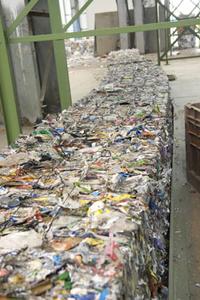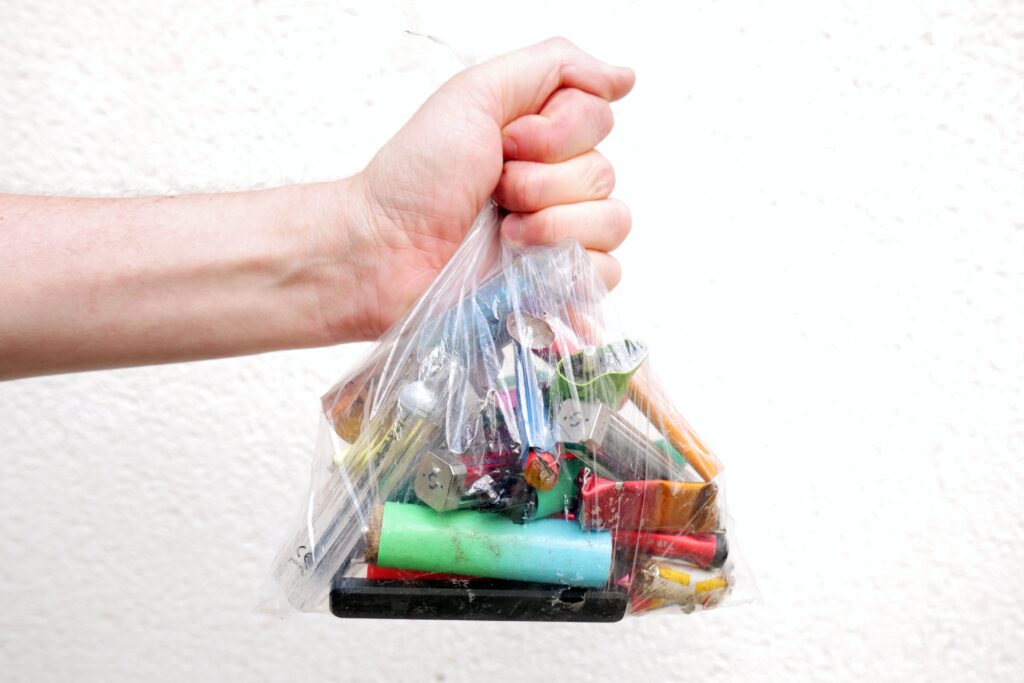As companies are forced to hold onto material for which they cannot yet find a buyer, there has been greater focus on the handling and sorting of recovered materials at material recycling facilities.
And, despite the slowdown, Greenstar UK's £7 million sorting facility near Birmingham continues to serve local authorities such as Blackburn with Darwen, Cannock, Birmingham and Staffordshire and cater for waste collected single stream (commingled), dual stream (where paper and card is collected separately) or, in some cases, even source separated.
Nigel Manning, managing director of Greenstar UK, told letsrecycle.com that the company's operations had not really been affected by the economic downturn – which has seen the price paid for recovered paper, card, plastic and metal plummet – because of the security of its long-standing relationships with reprocessors and the fact that it could send some materials to its own reprocessing facilities.
For example, the company keeps HDPE plastic bottles internally and sends them to its own bottle-to-bottle recycling plant in Cleveland for reprocessing.
However, Mr Manning acknowledged that it had been difficult to find markets for some materials such as plastics and paper in the short term, forcing the firm to stockpile some material.
And, he said the company was keen to increase quality of its output at this time. For instance, it intends to invest in around £100,000 worth of technology to improve the quality of glass sorted at Aldridge enabling more to be sold for remelt, as well as creating the grade it currently produces for the aggregate market.
Extensions
Commenting on yesterday's (November 10) meeting to discuss the potential relaxing of waste management exemptions and extensions (see letsrecycle.com story), Mick Davis, Greenstar business development director, told letsrecycle.com that he was hopeful the firm would be permitted to store steel outside, which would free up room for material to be stored on behalf of other companies.
Mr Manning added that the company intended to use the Atlas warehouse building that it purchased for the development of a ‘Super-MRF' in North London as a bulking station for recyclables collected in the Greater London area.
Unveiled in August, plans for the Edmonton facility showed the intention to cater for 9% of waste arising in North London and also provide a waste transfer station capable of handling a further 250,000 tonnes of recyclables. (see letsrecycle.com story)
Mr Manning claimed that it would still be more attractive for business to be charged a gate fee for this purpose rather than having to pay for the material to be landfilled.
Aldridge
The colossal plant at Aldridge, which is the focal point of Greenstar's burgeoning UK MRF empire, has experienced few teething problems since it became operational in early August and continues to create baled, recovered material for sale, Mr Manning explained.
Putting the onus on producing a higher quality material, the facility sorts around 250,000 tonnes of dry recyclable material a year despite having a licence to process 300,000 tonnes, meaning that it has a contamination rate between just 5 and 6%.
Mr Manning said: “We sort 10,000 tonnes a month, the majority of which is single stream, and are doing so 24 hours a day, seven days a week.”
“We can run this very quickly but we don't because the quality currently is very good. Quality is the most important thing at the moment and we are continuing to deliver it,” he added.
Mr Manning, who previously worked for Biffa Waste Management, was sure that one consequence of the downturn in recovered material prices would be the increasing demand for higher quality material and that this would intensify as demand for materials remained volatile.
He said: “When we see people struggling, then people will start going for the better quality stuff first.”
Using technology from Dutch company Bollegraaf, the Aldridge facility currently handles material such as paper, card, aluminium, glass, steel and plastic and the company has attempted to improve the ability of the plant through its experience of running 19 MRFs in North America and a number of other plants in Ireland.
Looking further ahead, Greenstar is hopeful of further additions to its MRF network, which currently includes facilities in Leeds, Blackburn, Dunstable and Leicester, with murmurings of developing a new plant to the south of Birmingham and another to the south of London.












Subscribe for free